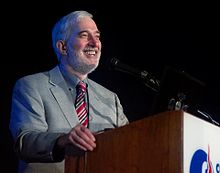Ronald A. Lindsay
| Ronald A. Lindsay | |||||
|---|---|---|---|---|---|

Ron Lindsay giving a lecture on his book, "The Necessity of Secularism."
|
|||||
| Nationality | American | ||||
| Education | PhD Georgetown University, JD University of Virginia | ||||
|
|||||
Ronald A. Lindsay was president and CEO of the Center for Inquiry and of its affiliates, the Council for Secular Humanism and the Committee for Skeptical Inquiry. He held this position June 2008 - 2016.
Lindsay has a PhD in philosophy from Georgetown University, with a concentration in bioethics. He is the author of the book Future Bioethics: Overcoming, Taboos, Myths, and Dogmas (Prometheus: 2008). The book was favorably reviewed by the journal Nature, which described it as “reasoned, readable, and accessible.” In the book Lindsay argues for, among other things, legalization of assisted suicide and a removal of restrictions on embryonic stem cell research. He has published a number of articles in peer-reviewed journals, including the Kennedy Institute of Ethics Journal and the American Journal of Bioethics. These articles, like his book, focus on topics in bioethics, including the morality of assisted suicide and human enhancement technology. Lindsay also wrote the essay on Euthanasia for the International Encyclopedia of Ethics (Wiley-Blackwell: 2013).
Lindsay has also written several articles on ethical issues for Free Inquiry, the publication of the Council for Secular Humanism. These articles include a vigorous defense of equal rights for LGBT individuals, and a discussion of the foundation for a nonreligious ethics.
Lindsay’s latest book is The Necessity of Secularism: Why God Can’t Tell Us What to Do (Pitchstone 2014). In this book, Lindsay argues that for democratic discourse to be successful, religious doctrines need to be kept out of public policy discussions, since these doctrines are meaningful only to members of particular religions.
In addition to his PhD in philosophy, Lindsay has a law degree from the University of Virginia. Before joining the Center for Inquiry, he practiced law for twenty-six years with the law firm of Seyfarth Shaw LLP. He concentrated in employment law and his appellate cases indicate he represented employers.
...
Wikipedia

